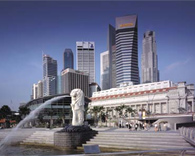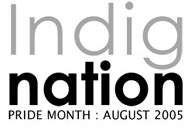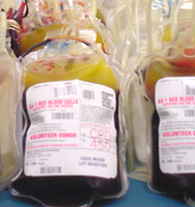Gay tourists risk imprisonment, warns Aussie Govt
The Australian government on Monday warned its citizens that they could face imprisonment if they are caught having gay sex in Singapore.

Singapore skyline. Image courtesy of the Singapore Tourism Board.
Under the heading "Local Law and Customs," the advisory reminded Australians that they are subject to local laws when they are overseas.
"Local laws and legal processes can be very different from those in Australia. A violation of local laws may result in a jail sentence, served in a local prison. Consular assistance cannot override local law, even where local laws may appear harsh or unjust by Australian standards."
Under the Singapore Penal code, which was derived from English criminal law, gay sex acts are punishable by a maximum of two years in jail.
In a report on its web site, the Singapore Tourism Board revealed that travellers from Australia (292,000) formed the fourth largest group of tourists after Indonesia (847,000), India (288,000) and China (352,000) from January to June 2005.
POST/READ COMMENTS
Related site:
Travel Advice for Singapore - Australian Department of Foreign Affairs and Trade
Singapore celebrates "IndigNation"
"Same-sex love has been very misunderstood in Singapore, and I have heard on too many occasions that it is contrary to conservative Asian values. If one has any understanding of traditional Chinese culture, he or she would know that before the Song dynasty, there was no law or taboo against same-sex intimacy." Said Dr Tan Chong Kee in an interview with Fridae.com.

The move takes advantage of Prime Minister Lee Hsien Loong's announcement made last August that authorities will "exempt indoor talks from licensing requirements unless they touch on sensitive issues like race and religion."
Named IndigNation, the event reflected the organisers' stand on the "unreasonable ban on parties for gays and lesbians and heavy censorship of publications serving this community."
In the past six months, authorities had outlawed three gay events including the annual Nation party which had been held since 2001. In March, a junior health minister caused an uproar when he said that the Nation party may have been the cause of a sudden rise in the number of local AIDS cases despite not having any numbers to support his statements. The party will now be held in Phuket, Thailand from Nov 4-6.
POST/READ COMMENTS
Related sites:
IndigNation/Schedule of Events
Nation.V
California court supports partnership rights for same-sex couples
California businesses must give spousal privileges to registered same-sex couples, the state Supreme Court ruled Monday by a vote of 5-0.
The decision by the California Supreme Court came after Birgit Koebke, 48, challenged a country club policy after being told her long-time lesbian partner could only play as a guest six times a year while paying up to US$92 a round. The San Diego club however allows the children, grandchildren and spouses of heterosexually married members to play golf for free.
In line with the new ruling, businesses that provide discounts, special services or other privileges to married couples must extend the same rights and benefits to same-sex domestic partners. This includes banks, mortgage lenders, auto insurers and health clubs. Beginning in 2007, all businesses with large state contracts will be required to offer domestic couples the same benefits that spouses enjoy.
The current version of California's Domestic Partner Law, which took effect on January 1, grants to registered partners most of the rights of spouses under state law. Business that extends benefits to spouses it denies to same-sex couples engages in "impermissible marital status discrimination."
In related news, the sponsors of a proposed constitutional amendment that would ban gay marriage have sued California's attorney general Tuesday over the summary the state prepared for the group's signature-gathering petitions.
Attorney General Bill Lockyer wants the title of the amendment "The Voters' Right to Protect Marriage Initiative" changed to "Marriage. Elimination of Domestic Partnership Rights" to better reflect the measure by highlighting its effects on registered domestic partners as it would strip them of domestic partnership rights.
In Massachusetts, gay marriage opponents on Tuesday filed a ballot initiative aimed at amending the Constitution to ban gay marriages. The initiative would define marriage as between a man and a woman. Massachusetts is the only state to allow gay and lesbian marriages, which the state Supreme Judicial Court legalised in 2003.
POST/READ COMMENTS
Australian Ban on gay blood donors challenged
A Tasmanian man has launched a legal challenge against the Red Cross for refusing to let him donate blood because he is gay. He has filed a complaint with the Tasmanian Anti-Discrimination Commission and the Australian Human Rights Commission.

The United States Food and Drug Administration bans blood donations from any man who had had sex with another man, even once, since 1977. The policy started as a guideline in 1983, before blood could be tested for HIV.
The man also said that he was denied the opportunity to explain that he is in a monogamous relationship, or to be tested to establish whether he has healthy blood.
Local gay and lesbian lobby groups want the Red Cross to change its policy preventing sexually active gay men from donating blood.
LGBT groups supporting the man's claims say the policy is outdated and discriminatory.
"Now we know AIDS is not simply a gay disease, it's a disease anyone can catch, it's time for the Red Cross to change its policy and focus on whether donors have safe or unsafe sex rather then the gender of the person they have sex with," Said Tasmanian Gay and Lesbian Rights Group spokesman Rodney Croome.
The Australian Red Cross Blood Service has defended its policy as the exclusion of gay men was based on a statistically higher incidence of some blood-borne diseases among gay men, and the existence of "window period" infections - infections which may be incubating in the body at the time of donation.
In late July, Sweden's Prime Minister Goeran Persson became the first world leader to call for an end to the ban on gay men from donating blood or organs.
Many countries including the United States, Canada, Britain, Singapore and Hong Kong have a lifetime ban on gay men donating blood. The United States Food and Drug Administration bans blood donations from any man who had had sex with another man, even once, since 1977. The policy started as a guideline in 1983, before blood could be tested for HIV.
POST/READ COMMENTS
